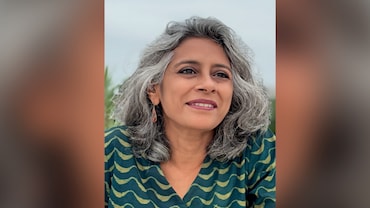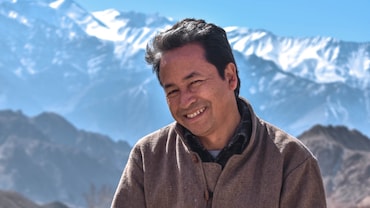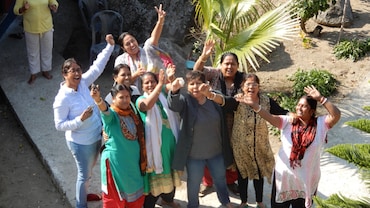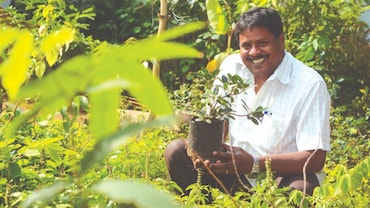Preserving Ancestral Recipes: In Conversation with Author Sudha Menon
Having recently released her cook book Recipes for Life, Sudha Menon talks about her passion and inspiration to preserve what is closest to her heart.
 Sudha Menon
Sudha Menon
Across the world, the one thing that possesses the ability to bring people together regardless of all differences is good food. The cuisine of a place and culture stands for so much more than just sustenance and nourishment, though those are its two primary purposes. Food carries our relationships, our identities, our memories and longings—all ensconced within an unspoken language experienced through fragrance and flavour.
Author Sudha Menon’s latest book Recipes for Life captures the myriad sentiments and sensations accompanying food, by documenting family recipes from the lives of various renowned personalities. The book attempts to celebrate and pay tribute to family legacies stitched together through food, and in the process inspire its readers to document their family legacies too.
Author, columnist, writing coach and model, Menon dons many hats with aplomb, and has authored six non-fiction books, whose themes range from inspirational stories of the disabled, letters from eminent personalities to their daughters, survival advice to career women and the chronicles of her life as a feisty woman at fifty.
How did you come up with the idea for this book?
Sometime in 2016 my mother-in-law, a wonderful cook who pampered her family with great food for over 60 years, passed away from the ravages of dementia. The summer after she passed away, I missed her familiar telephone call: “Your share of pickles and garam masala is waiting for you,” she would say. “Come and pick it up.” Aai was the purveyor of all the goodies for the family, stuff that she would prepare with passion, and distribute with love to the extended family. When she was gone, an entire legacy of family recipes left with her because no one had written them down. Aai learnt the recipes from her mother and mother-in-law but we had never bothered to learn it from her simply because we took for granted that she would always be around to feed us or guide us when we wanted to cook something special.
When I enquired among my friends and acquaintances, I realised the same situation is playing out within countless Indian homes. I believe food is such a big part of our cultural identity and if we don’t document our recipes, we stand to lose a big part of it.
I can see something similar happening with my siblings and I, as my mother, now seventy-five, is slowly but surely losing her memory and I am determined to not make the same mistake with her legacy. My sisters and I have already documented a lot of her recipes but I fear they are just a small percentage of her vast repertoire. I decided to turn this process into a larger project and started reaching out to people, asking them to share their food related memories and recipes with me.
The book showcases the diversity as well as commonality in India’s culinary traditions. Do you think it is a microcosmic reflection of our shared heritage, of the ways in which cultural diversity simultaneously defines us and connects us?
I reached out to people who had an interesting narrative and an appeal of their own because I wanted this project to be widely read and spark an interest in readers. I am hoping to catalyse a movement where all families begin creating a record of recipes of their own. Someone pointed out that this book could be an excellent example of inclusion and showcase foods from all over India, be it the villages of Manipur or a small town near Rameshwaram in Tamil Nadu, a hamlet in Kathiawad or villages in UP and Punjab.
I feel infinitely blessed that I was able to put this book together and get some amazing interviews and anecdotes: Mary Kom in the book talks about the simple and healthy meals that her mother cooked from the vegetables that she grew in their tiny kitchen garden and the fish her father caught at the nearby lake. Her family was poor and could not afford meat but Mary spoke about how she still longs for the meals the family had, while sitting cross-legged on the floor of their thatched-roof house in the hills of Manipur. “I learnt to cook traditional dishes by being with Anu (mother) in the kitchen, and I am happy I am able to cook those meals for my husband and three sons today. What makes me happier is that they too love the simplicity of the food from our village and our culture,” Mary adds.
One would imagine the favourite meal of Kotak Mahindra Bank’s honcho, Uday Kotak, would be the ones he enjoys on his global travels but he charmed me with his choice of a simple Kathiawadi meal of Batata-Watana Shaak (potato and green peas subzi) with roti, Moong Dal Khichdi made with fragrant Ambe mohor rice and Kadhi. His favourite sweet dish till date remains the Puran Polis his mother used to prepare for him as a child.
And talking of culture, I had at least two people: Michelin star chef Atul Kochhar and celebrity author Amish Tripathi, talk about their mothers who would force down lauki/karela down their throats for a week because they refused to eat vegetables and sneered at the dish. Respecting food and not wasting it is a universal practice across the Indian culture and these anecdotes from Kochhar and Tripathi reiterates it.
Oral narrations and traditions have played an important role in the process of teaching and learning in our country. How much of this is reflected in the handing down and preservation of family recipes?
I think oral traditions of teaching and learning is what preserves these recipes in Indian homes. No cookbooks, no handwritten notes, nothing. And I reckon that this is because that is how women bonded and formed their own support system. Today, with scattered families and the breakdown of the joint family system, oral traditions are no longer as common. It is a dying tradition and I am convinced we need to supplement it in a more permanent manner. I want us to write down recipes, record them, videotape them, do whatever it takes so that our future generations know what our ancestors ate.
 Picture Credit: Sudha Menon
Picture Credit: Sudha Menon
Home-cooked food is usually associated only with mothers and grandmothers, but in Recipes for Life actor Vidya Balan and designer Anavila Misra reminisce about their fathers’ cooking as well. How important is it for children to see their fathers and grandfathers participating in the culinary traditions of the family, so that the kitchen does not remain a gender-segregated space?
It is important for children to see everyone in the family contribute towards what’s being cooked at home so that they realise how joyful it is to create something that nurtures the family and to understand how much hard work goes behind all those delicious meals. Also, I firmly believe that cooking is a life skill and everyone must know how to cook so that they can sustain themselves.
What are some of your favourite memories centred on food, from your own life?
I will never forget rushing home from school every evening, throwing my school bag on the sofa, washing up and rushing into the kitchen where amma would have my favourite meal: piping hot rice with drumstick sambar and pappadum to go with it. Sometimes there would be a cabbage thoran on the side. I would gobble the dish and magically, the world would seem a better place to me. Even today, the same dish remains my ultimate comfort food when prepared by amma.
Sundays, when achchan (grandfather) was home, he would prepare breakfast for the family giving amma a break. He made the world’s best sunny-side-up, which had a sunshine-yellow egg yolk, and to go with these wobbly eggs were his favourite Shamshad Begum or Mukesh songs playing in the background. What made Sundays more special was that he would let us pick freshly-laid eggs from the coop in his garden in suburban Mumbai. Walking into the coop and picking the eggs under the careful gaze of mother hens made me feel very brave indeed.
In a world of fast-food joints and eating-on-the-go, what is the role of ‘slow food’ in the physical, emotional and psychological landscapes of our lives?
I think it is very important to cook meals at home, even though ordering in would seem so easier and more convenient. I was not as interested in cooking or being in the kitchen in my younger days but in my mid-fifties I find myself often pottering about in there, preparing dishes amma used to make and actually enjoy the process.
Amma is ageing and ill, slowly losing her memory but she miraculously transforms into an energetic, happy person the moment she hears that one of her children is visiting her and she immediately rustles up to cook her famed Malayali meals. That is also when she talks to us about the years when she was growing up in her home by the sea in Kerala, learning the nuances of cooking from her trio of aunts and later, as a young bride of 16, from her mother-in-law in Mumbai.
I believe cooking is therapy, a way to preserve our connection to our roots and the old ways. Of happier times when even a little was enough.
If you want to read more about the book click here .






